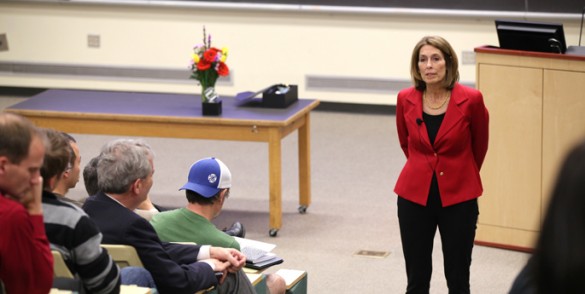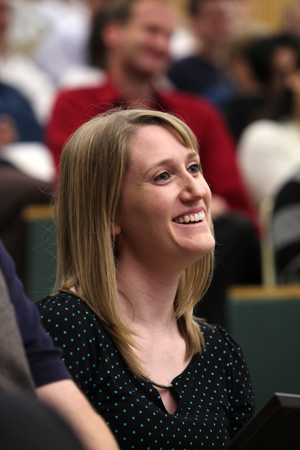
Science and beauty are linked, for when a scientist makes a discovery, “she sees something truly beautiful for the first time and reveals that beauty to the world.”
Thus Laurie Glimcher, M.D., an internationally known physician-scientist at Cornell University, began her Flexner Discovery Lecture last week after receiving the 2013 Vanderbilt Prize in Biomedical Science.
Glimcher, the Stephen and Suzanne Weiss Dean and professor of Medicine at Weill Cornell Medical College and Provost for Medical Affairs at Cornell University, is the eighth recipient of the Vanderbilt Prize, which was established in 2006.
The prize honors women who have made significant advances in the biological and biomedical sciences and who have contributed positively to the mentorship of other women in science. Awardees receive a $25,000 award and serve as mentors to women who are pursuing graduate studies in the biomedical sciences.

This year’s Vanderbilt Prize Student Scholar is Lisa Funkhouser-Jones, a Ph.D. student in the laboratory of Seth Bordenstein, Ph.D., associate professor of Biological Sciences and Pathology, Microbiology and Immunology. She was introduced by Jeff Balser, M.D., Ph.D., vice chancellor for Health Affairs and dean of the School of Medicine.
Funkhouser-Jones, who has won previous awards for research excellence, “embodies the finest character of intelligence, drive and insight that mark the truly dedicated scientists who have made or will make major advances in science,” Bordenstein wrote in his nomination letter.
Glimcher was introduced by Susan Wente, Ph.D., associate vice chancellor for Research and senior associate dean of Biomedical Science. In her lecture, she told the story of a beautiful transcription factor with an admittedly boring name — X-box-binding protein 1, or XBP1.
Discovered in 1990 by Glimcher and her colleagues, XBP1 was the first known transcription factor that controlled the transition of mature B lymphocytes into antibody-secreting plasma cells. It is a key component in the endoplasmic reticulum (ER) stress response, which expands the ER into a “factory” for antibody production.
Over the years, her lab has found roles for XBP1 in inflammatory gastrointestinal, metabolic and autoimmune disorders and, most recently, in triple-negative breast cancer.
In a paper published online March 23 by the journal Nature, Glimcher and colleagues showed that XBP1 interacts with another transcription factor, hypoxia-inducing factor 1-alpha, to drive tumor progression and recurrence. Targeting this pathway may lead to novel treatments for this highly aggressive breast cancer, she said.
Science is a profession in which one can dream big and do things that really matter, Glimcher said. “I was fortunate enough to have that opportunity,” she said. “Today, my dearest wish is that every young woman who aspires to such a life will have the same opportunity.”
For more information about the Vanderbilt Prize, go to https://medschool.vanderbilt.edu/dean/and click on “Vanderbilt Prize.” For a complete schedule of the Discovery Lecture series and archived video of previous lectures, go to www.mc.vanderbilt.edu/discoveryseries.















